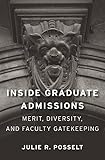Inside graduate admissions : merit, diversity, and faculty gatekeeping / Julie R. Posselt.
Material type: TextPublisher: Cambridge, Massachusetts : Harvard University Press, 2016Copyright date: �2016Description: 1 online resource (x, 250 pages)Content type:
TextPublisher: Cambridge, Massachusetts : Harvard University Press, 2016Copyright date: �2016Description: 1 online resource (x, 250 pages)Content type: - text
- computer
- online resource
- 9780674915640
- 067491564X
- Merit, diversity, and faculty gatekeeping
- Universities and colleges -- United States -- Graduate work -- Admission
- Discrimination in higher education -- United States
- Minorities -- Education (Higher) -- United States
- Universities and colleges -- United States -- Faculty
- Teacher participation in administration -- United States
- School Admission Criteria
- Education, Graduate
- Social Discrimination
- Minority Groups -- education
- United States
- EDUCATION -- Higher
- EDUCATION -- Administration -- Higher
- Discrimination in higher education
- Minorities -- Education (Higher)
- Teacher participation in administration
- Universities and colleges -- Faculty
- Universities and colleges -- Graduate work -- Admission
- United States
- 378.1/55 23
- LB2371.4 .P67 2016eb
- LB 2371.4
Includes bibliographical references and index.
Introduction: Gatekeeping reconsidered -- Decision making as deliberative bureaucracy -- Meanings of merit and diversity -- Disciplinary logics -- Mirror, mirror -- The search for intelligent life -- International students and ambiguities of holistic review -- Conclusion: Merit beyond the mirror.
"How does graduate admissions work? Who does the system work for, and who falls through its cracks? More people than ever seek graduate degrees, but little has been written about who gets in and why. Drawing on firsthand observations of admission committees and interviews with faculty in 10 top-ranked doctoral programs in the humanities, social sciences, and natural sciences, education professor Julie Posselt pulls back the curtain on a process usually conducted in secret. Inside Graduate Admissions presents admissions from decision makers' point of view, including thought-provoking episodes of committees debating the process, interviewing applicants, and grappling with borderline cases. Who ultimately makes the admit list reveals as much about how professors see themselves--and each other--as it does about how they view students. Professors in these programs say that they admit on merit, but they act on different meanings of the term. Disciplinary norms shape what counts as merit, as do professors' ideas about intelligence and their aversions to risk, conflict, ambiguity, and change. Professors also say that they seek diversity, but Posselt shows that their good intentions don't translate into results. In fact, faculty weigh diversity in only a small fraction of admissions decisions. Often, they rely upon criteria that keep longstanding inequalities in place. More equitable outcomes occur when admissions committees are themselves diverse and when members take a fresh look at inherited assumptions that affect their judgment. To help academic departments promote transparency and accountability, Posselt closes with concrete strategies to improve admissions review"--Publisher's website.
Print version record.
In English.
eBooks on EBSCOhost EBSCO eBook Subscription Academic Collection - Worldwide

